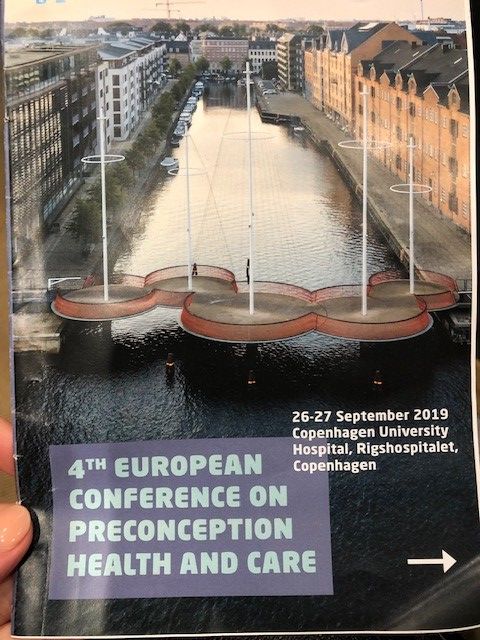
| The 4 th European Congress on Preconception Health and Care was held at the Copenhagen University Hospital in Denmark, September 26-27, 2019. The meeting brought together almost 200 people from across Europe as well as from Australia, Japan, Moldova, China, Canada and the US. The forum for the event was shaped by the hosts who largely focused the program this year on issues relating to fertility, men’s reproductive health, ethics, and the larger determinants of health and well-being. A key challenge for providers in Europe is addressing issues around delayed childbearing and resulting decreased fertility. As one speaker noted that “biology has not kept up with feminism.” Lack of knowledge about fertility and reproduction, in general, are two issues as is an overly positive perception of the efficacy of treatment for fertility problems. Another challenge is that women report that they aren’t able to find a partner who is ready to become a parent. The presentations, strategies shared, and question/answer sessions fostered interesting and robust conversations. Research about the influence of men’s health and sperm quality on conception and healthy births was discussed widely. With growing evidence that poor nutrition, substance use, age, chronic disease, and environmental exposures impact sperm quality, the necessity of expanding preconception health messages to all genders is clear. Where the responsibility for providing this care and these messages falls was an interesting conversation topic. Dr. Hafez Ismaili M’hamdi and Sharissa Smith, both from the Netherlands, offered thought-provoking lectures around the ethics of preconception health and health messaging. Dr. M’hamdi focused on health justice, interrogated the concept of supply and demand in preconception health, and underscored the importance both taking “women out of poverty, and poverty out of women.” He quoted a new book on health inequalities in Europe by Mackenback (2019) that found that “Health inequalities have not only persisted while welfare states were being built up, but on some measures, have even widened, and are not smaller in European countries with more generous welfare arrangements.” Sharissa Smith’s doctoral presentation on preconception health messaging was one of the prize winners for the Congress. The UNC team will be reaching out to both speakers to continue this important conversation. Presentations on the impact of environmental exposures and climate change on fertility identified yet another worrisome link for young people coming of age during this time. The connection between the climate and healthy reproductive is clear and should be a clarion call for the field to link arms with those working for environmental justice. Authors of the recent Lancet series on preconception health also presented messages about the importance of providing supports to individuals while also focusing on policies and resources to promote larger community well-being. Overall, it was heartening to learn that people in other countries face challenges similar to ours in the US and exciting to see all the research, programs and energy in this space. As a bonus, it was encouraging to know that the time we continue to invest in ShowYourLoveToday and BeforeandBeyond matters to people around the world. Many thanks to the Danish organizing committee who did a wonderful job. Mark your calendars for London 2021! |